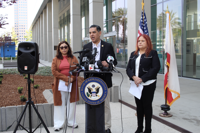
(Left to right) Cindy Panuco, Sonja Diaz, Beatriz Acevedo, Capri Maddox, Priscilla Chavez, Liliana Perez and Celine Cordero. Photo by Brenda Verano
Six Latina women excelling in various male-dominated sectors of Los Angeles were recognized and celebrated by the L.A. Civil Rights Department.
On Tuesday, in honor of Hispanic Heritage Month, celebrated annually from September 15 to October 15, the department hosted its first “Latinas Leading Change: Trailblazers in Advocacy, Philanthropy, Business, Academia, Entertainment, and Wealth” panel at the Latino Theatre Company in downtown, L.A.
The department enforces the city’s Civil and Human Rights Law investigating claims of discrimination in private sector areas of commerce, education, employment and housing. They also work to reduce bias and injustices and promote equity through inclusive programming, including the panel hosted last week.
The panelists included Sonja Diaz, co-founder of the Latina Futures 2050 Lab and director of UCLA's Latino Policy and Politics Institute, Beatriz Acevedo, chief executive officer of SUMA Wealth, a financial tech company that empowers Latinos through financial education and wealth-building strategies, Celine Cordero, deputy chief of staff for L.A. Mayor Karen Bass, Liliana Perez, senior director of cultural affairs at the Los Angeles Chargers and Priscilla Chavez, business development manager at PCL Construction.
Capri Maddox, executive director of the L.A. Civil Rights Department, said the department chose and invited the women on the panel with great intention, as they have been prominent leaders in the city and county-wide efforts.
“We wanted to show the cross-industry support for Latinas in the City of Los Angeles,” Maddox told CALÒ News. “We were actually very intentional to send a strong message that you can't pigeonhole Latinas in Los Angeles. Tonight you saw the best of Latinas in Los Angeles. And we wanted to also create an opportunity so that anyone from any background could identify with this panel. These ladies could change the world tonight.”

Inside the Latino Theatre Company in downtown, L.A. Photo by Brenda Verano
Maddox introduced the event by talking about the injustices that Latinas are still facing throughout the United States, specifically the gender pay gap. In 2023, women were paid 21.8% less on average than men, according to the Economic Policy Institute.
The same data also showed that Black and Hispanic women experience the largest pay gaps. Black women are paid only 69.8% of white men’s wages, a gap of $8.65 on an hourly basis, which translates to roughly $18,000 less annual earnings for a full-time worker. For Latinas, the gap is even larger, as they are paid only 64.6% of white men’s wages, an hourly wage gap of $10.15. For a full-time worker, that gap is over $21,000 a year.
“We are celebrating tonight. We are not where we once were but we are not where we want to be,” Maddox said.
Tuesday’s panel touched on topics such as inclusivity, representation, Latinidad, financial education and confidence.
The panel was hosted by , Cindy Pánuco, a daughter of two immigrants from Jalisco, Mexico, who was recently appointed by Governor Gavin Newsom as judge in the Los Angeles County Superior Court. “It’s an honor to be here tonight,” Pánuco said. “I can't help but realize that it's one week after Mexico [elected] its first woman president.”
Diaz, who founded the Latina Futures 2050 Lab, which seeks to increase knowledge and insight through applied policy research on the contours of the economic, political and social lives of Latinas living in the U.S., talked about the male gaze and the need for more advancement of equitable representation and opportunities for Latinos and Latino communities. “Unfortunately, across democratic society in this country, we have been dominated by non-Hispanic male gaze,” she said. “If we invest in Latinas and lift up their economic prosperity, everybody wins.”
Diaz also said that Latina representation is needed beyond electoral lines. “It's beyond elections and political power. I think it's our judges, our philanthropic institutions, our art and cultural centers, the people that run our buses and the workers that are able to [create] a sense of leadership. Despite an overwhelming history of generations of being here, Latinos are often relegated to invisibility, and that hurts all of us.”
Acevedo, who for more than 20 years has been an entrepreneur dedicated to economic empowerment within the Latino community, also talked about her work in media, especially when she cofounded the Latino-focused digital media company mitú in 2012.
She said that for years she fought for more Latino representation in movies, television, screenings and media overall. “But at some point I started being more concerned about what we thought of each other and less concerned about what others thought of us [Latinos],” she said. “We can't wait for somebody to invite us to the table. We really need that economic power. Until we have economic power, we're not going to have the power that we deserve.”
One of the most expected guests was Cordero, who in many ways is Bass’s right hand. As her deputy chief of staff, she talked about the mayor's commitment to bring and employ more Latinas in government operations, contributing to policy-making.
She made reference to Latinas holding some of the most important jobs in the county, such as Janisse Quiñones, the Chief Executive Officer and Chief Engineer of the Los Angeles Department of Water and Power, the nation’s largest publicly owned utility, as well as Lourdes Castro Ramirez, who was appointed by Bass as the Chief Housing and Homelessness Officer. “We have a number of Latinas in the administration that maybe you don't always see because we have a very large staff, but the truth is there are a lot of Latinas in that administration,” she said.

Priscilla Chavez (left) and Liliana Perez (right). Photo by Brenda Verano
Perez, who leverages her position to foster community engagement and promote diversity in sports management and operations for the L.A Chargers along with Chavez, who has worked for inclusivity and equality in the construction industry, were both at Tuesday’s event.
Chavez and Perez talked about Latinidad and gave the approximate 100 attendees a message to be confident and proud of everything that makes the Latinas. Perez, who grew up in Pico Union, said she did not have spaces like this forum growing up and therefore advised the young people in the audience to take advantage and make connections, and more importantly, know their purpose in everything they do. “We have to always understand what it is to be culturally convicted of who you are—understanding why you wake up everyday and who's going to be around you to help carry [your] vision,” Perez said. “I hope you embrace that opportunity to say, ‘Who else is missing from the table? And who else do I need to bring in?’”
Chavez talked about how working in engineering and construction made her gain the confidence needed to navigate life. “Whether it was a meeting where I was at or me leaning into the opportunity when they said, ‘Hey, we are looking for excellence,’ I believed it and what happened after [was] magic,” she said.















(0) comments
Welcome to the discussion.
Log In
Keep it Clean. Please avoid obscene, vulgar, lewd, racist or sexually-oriented language.
PLEASE TURN OFF YOUR CAPS LOCK.
Don't Threaten. Threats of harming another person will not be tolerated.
Be Truthful. Don't knowingly lie about anyone or anything.
Be Nice. No racism, sexism or any sort of -ism that is degrading to another person.
Be Proactive. Use the 'Report' link on each comment to let us know of abusive posts.
Share with Us. We'd love to hear eyewitness accounts, the history behind an article.